Federal Appeals Court Dismisses Challenge To Commission On Presidential Debates
A Federal Appeals Court has upheld the dismissal of a lawsuit filed by Gary Johnson and Jill Stein regarding their exclusion from Presidential debates.
A Federal Appeals Court in Washington, D.C. has upheld a decision dismissing a lawsuit filed by Gary Johnson and Jill Stein, respectively the nominees of the Libertarian and Green parties in both 2012 and 2016, against the Commission on Presidential Debates:
Third-party candidates Gary Johnson’s and Jill Stein’s rights were not violated when they were excluded from presidential debates during the 2012 campaign, a federal appeals court ruled on Tuesday.
The pair, who also ran for the White House in 2016 as the nominees of the Libertarian and Green parties, claimed their First Amendment rights had been violated, alleging that their participation was denied “because of hostility towards their political viewpoints.”
The U.S. Court of Appeals for the D.C. Circuit rejected their argument, however.
“Every four years, we suffer through the celebration of democracy (and national nightmare) that is a presidential election. And, in the end, one person is selected to occupy our nation’s highest office,” wrote Judge Janice Rogers Brown, a George W. Bush appointee who announced she would be retiring at the end of August, in the majority decision. “But in every hard-fought presidential election there are losers. And, with quadrennial regularity, those losers turn to the courts.”The Johnson and Stein campaigns also brought antitrust claims into the mix, saying that the two-party system and overall requirements for participation in presidential and vice presidential debates constituted a political monopoly of sorts.
Challenges such as this are not unusual, of course. Just as Presidential debates are a quadrennial tradition in the United States, so too are the complaints of third-party candidates and others who are excluded from debates at either the primary or general election stage. Over the years, these lawsuits have alleged any number of differing legal theories in an effort to get around the fact that they have failed to meet the criteria set by the debate sponsor(s) to qualify them for an invitation. Typically, it has been the fact that the candidate(s) in question have failed to garner sufficient support in relevant polling to indicate that they should be extended an invitation that has barred most of these candidates. In some cases, though, other factors, such as the fact that they failed to qualify for the ballot in a sufficient number of states to garner a majority in the Electoral College or that they do not meet the eligibility requirements set forth in the Constitution regarding eligibility to serve as President. The most common objection has been that excluding third-party candidates from the debates is somehow a violation of the First Amendment even though debate sponsors are generally not government entities and therefore presumably not covered by the First Amendment. Additionally, some candidates have argued that sponsors who invite some candidates but not other are effectively giving an in-kind contribution to the candidates that are invited in violation of election laws and Federal Election Commission recommendations. Johnson and Stein did not make the in-kind contribution argument in their lawsuit, but they did advance a First Amendment theory as well as the apparently unique theory that the debate restrictions were an illegal restraint of trade in violation of the relevant antitrust laws. While previous courts have rejected both the First Amendment and in-kind contribution arguments in the past, the antitrust argument appears to be a new one that hadn’t been ruled on previously. Notwithstanding this new argument, though, Johnson and Stein lost at the District Court level in a ruling handed down in 201X, and that ruling was sustained on appeal.
On the antitrust issue, the Court essential found that Johnson and Stein did not have standing to bring an antitrust claim based on the facts alleged and that the antitrust laws were not intended to address the conduct complained of:
To understand the scope of antitrust standing, we focus on the bedrock principle of this field: antitrust laws protect market (i.e. economic) competition. Brunswick Corp. v. Pueblo BowlO-Mat, Inc., 429 U.S. 477, 488 (1977). Plaintiffs, however, define their injuries as millions of dollars in free media, campaign donations, and federal matching funds—injuries to them as individual candidates in a political contest for votes. Square peg, meet round hole.
As an initial matter, this Court has clearly held injury to a single competitor does not suffice to constitute an injury to competition. See Dial A Car, Inc. v. Transp., Inc., 82 F.3d 484, 486-87 (D.C. Cir. 1996). Further, and most important, “neither the business of conducting the government nor the holding of a political office constitutes ‘trade or commerce’ within the meaning of the Sherman Act.” Sheppard v. Lee, 929 F.2d 496, 498 (9th Cir. 1991). This conclusion—that an antitrust violation must involve injury to commercial competition—is supported by Plaintiffs’ inability to define a commercial market in which they operate. Instead, they discuss the “presidential campaign market,” “the electoral politics market,” and the ”presidential candidates market,” Compl. ¶¶ 1, 11, JA 15, 18, and identify their product as “information about themselves or other presidential candidates,” Blue Br. 23. While these terms may capture what political scientists call a “political economy,” the phrase is merely a term of art. Short of alleging Americans are engaged in a widespread practice of selling their votes—which the Complaint does not do—the “market” Plaintiffs identify is no more regulated by the antitrust laws than the “marketplace of ideas” or a “meet market.”The injuries Plaintiffs claim are simply not those contemplated by the antitrust laws. Consequently, Plaintiffs’ antitrust claims fail to meet the requirements of antitrust standing.
With respect to the First Amendment, the lack of state action was unsurprisingly the ground for dismissal:
Finally, we turn to Plaintiffs’ First Amendment claim. Perhaps in an effort to tack around unfavorable case law, the Complaint states the Commission’s debates “exert a de facto influence on the outcome of presidential elections” such that exclusion from the debate, “in light of proven political realities, guaranteed [Plaintiffs] to lose.” Compl. ¶¶ 110-11, JA 54. Plaintiffs therefore allege the fifteen percent polling criterion, ”selected by Defendants with the specific intent of suppressing the viewpoints of third party or independent presidential candidates and to boost the political speech of the two major party nominees,” constitutes an “unreasonable burden on free speech or political association in violation of the First Amendment.” Compl. ¶¶ 119-20, JA 56; see also id. ¶ 130, JA 57 (alleging the fifteen percent requirement “imposes a burden on voting and associational rights in violation of the First Amendment”); see generally Ark. Educ. Television Comm’n v. Forbes, 523 U.S. 666 (1998).
None of these allegations articulate a clear legal claim, let alone identify a cognizable injury. To make matters worse, the Complaint omits entirely any allegation of government action, focusing entirely on the actions of the nonprofit Defendants. See, e.g., Rendell-Baker v. Kohn, 457 U.S. 830, 837-43 (1982) (discussing the state action requirement).
In Steel Co. v. Citizens for a Better Environment, the Supreme Court observed that, in some “extraordinary” cases, federal courts may pretermit the jurisdictional threshold and dismiss a claim that is “so insubstantial, implausible, foreclosed by prior decisions of [the Supreme] Court, or
otherwise completely devoid of merit as not to involve a federal controversy.” 523 U.S. at 89. The First Amendment claim here fits the bill. Under these circumstances, it would be improper—and indeed impossible—for the Court to conduct a meaningful standing analysis. There may be First Amendment injuries we could invent for Plaintiffs, but those claims were not presented in the Complaint. See Warth v. Seldin, 422 U.S.
490, 509-10 (1975) (examining the face of the complaint to determine whether a plaintiff has established Article III standing).
The Court’s ruling seems entirely correct to me. On the antitrust issue, more than a century of case and statutory law make clear that these laws were intended to regulate and govern economic activity such as mergers, not politics or the proper manner of conducting a Presidential campaign. Arguing that exclusion from a Presidential debate is, on a legal level, as absurd as a man who would argue that women are violating the Sherman Antitrust Act by consistently rebuffing his romantic overtures. That type of claim would be laughed out of court in short order, and so should the Antitrust claim advanced here by the Plaintiffs. Similarly, the First Amendment argument advanced by the Plaintiffs was similarly without merit, largely due to the fact that the Commission on Presidential Debates is not a government entity, and neither are the Democratic or Republican parties. As a result, there can be no viable First Amendment claim against them. It is true that there have been a limited number of cases where the Supreme Court has ruled that non-government entities can be subject to the First Amendment (see e.g. Marsh v. Alabama, in which the effort of a “company town” to bar leafleting was struck down, and Terry v. Adams, in which “whites only” primaries purportedly run exclusively by a local Democratic party were held to be barred by the First, Fourteenth, and Fifteenth Amendments) those cases are easily distinguishable from this case.
As a matter of policy, I agree with the position that Johnson and Stein take in their lawsuit and the arguments that other candidates who have been excluded from debates in the past have made. As a general rule, these Presidential debates should be far more open to competing candidates than they are at both the primary and the general election stages of an election. That doesn’t mean that there should not be any criteria at all for debate participation, of course, but the idea that the rules are designed in a way that virtually guarantees that the only participants end up being the nominees of the two major parties. This is especially relevant given the fact that the Commission on Presidential Debates, which has sponsored the General Election debates for Presidential elections for more than twenty years now, is essentially a cartel controlled by the Democratic and Republican parties and that the rules that are set during each election are set by the Commission in consultation with the campaigns of the Democratic and Republican parties. Neither of these parties has any real interest in giving debate time to outside candidates, of course, so it’s not surprising that they end up drafting rules that make it next to impossible for third-party candidates to qualify. Even in 2016, when Johnson was polling near 10% nationwide in the month before the debates began while Stein was averaging around 5%, neither candidate was able to meet the 15% threshold set by the Commission.
In an ideal world, there should be more openness toward other voices so that the American people have an opportunity to examine all of the viable options for President. Obviously, some minimal requirements are entirely appropriate. For example, it is entirely reasonable to require that only persons who are Constitutionally eligible will be invited to debates as there is no point in having someone who is under 35, not a natural-born citizen, or who has not been a resident of the United States for at least 14 years participate in the debates. Similarly, there is no point in having someone who has not qualified for the ballot in enough states to attain at least 270 Electoral Votes should they win there on the debate stage. When it comes to polling performance, though, it would arguably be ideal to use some kind of sliding scale. For early debates, the threshold for qualification should be something lower than 15%, perhaps as low as 5%, to allow for candidates who are polling higher than third-party candidates usually do to participate and have at least one opportunity to present their case to the public. Later debates can raise the polling threshold so that, by the end, the public can focus on the candidates most likely to win the election in the final weeks of the campaign. Finally, control over the debate rules should be in the hands of a non-partisan entity such as the League of Women Voters, not a “commission” that is nothing more than a proxy for the two major parties.
All of this is a policy debate, however. As a matter of law, it seems clear that the Court of Appeals got this decision correct. Under the law, Johnson and Stein had no case and it should have been dismissed.
Reason’s Brian Doherty reports that the lawyers for the two Plaintiffs are already planning to appeal this decision, with their first step in that process to be an application for an en banc reconsideration of the case by the full Court of Appeals. As I’ve noted before, granting that request is entirely within the Court’s discretion and requires a majority of the Judges on the Court to agree to the request. If that request is denied, or if it is granted and Johnson and Stein still lose, which it seems likely they would, then they could seek review before the Supreme Court. The odds that the Court would grant review, though, seem to me to be unlikely. There is a problem here, but it isn’t one the Courts can or should address.
Here’s the Opinion:
Johnson Et Al v. Commission on Presidential Debates by Doug Mataconis on Scribd
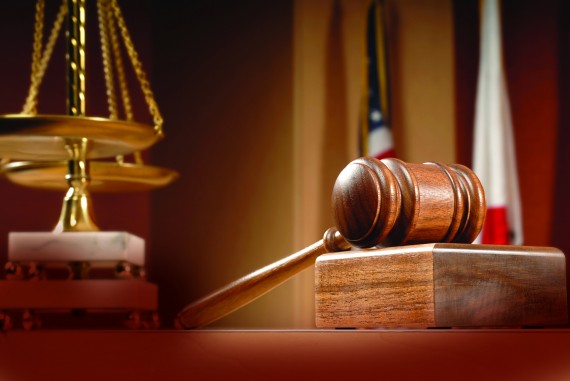

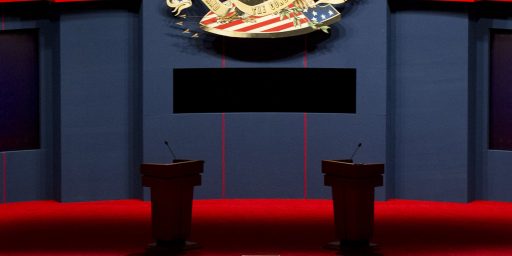
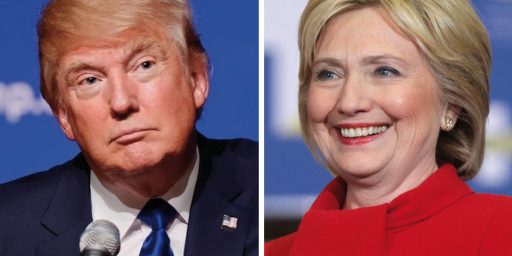
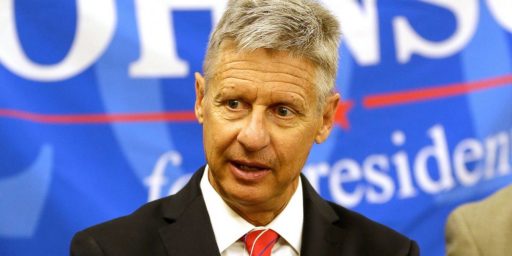
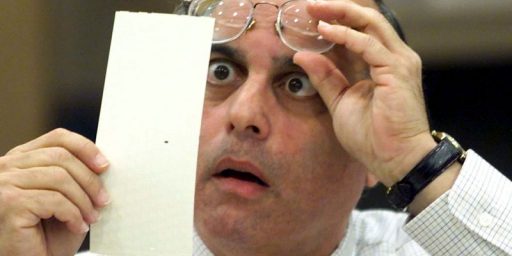
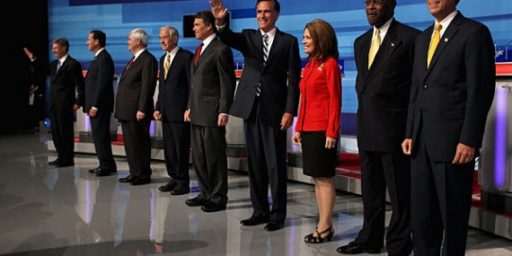
I agree. I’ve shared before that one of the best debates I ever heard was the 2006 Massachusetts gubernatorial debate between Democrat Deval Patrick (who won the election), Republican Kerry Healey (Romney’s Lieutenant Governor), a Green party candidate (a Boston area social worker), and an Independent who I believe had been State Treasurer. It helped that each of the four was well-informed, well-spoken, and respectful.
It was a great debate, because they each brought a different viewpoint to it: jobs and an economy that works for everyone from Patrick; fiscal responsibility from Healey; addressing poverty and the social safety net from the Green candidate; and ethics and accountability from the Independent. A newspaper commentator remarked the next day that the ideal candidate would be a combination of the four.
I would be remiss if I didn’t mention that the 2006 debate was a big contrast from the 2002 four-way debate, when Romney and the Democratic candidate did well, but the Independent was an ignorant know-nothing, and the Green party candidate was Jill Stein (nuff said).
Agreed. It was a frivolous action from the outset. I generally dislike Rogers, but her reasoning here is both legally sound and logical.
The reality was Johnson blew his chance by not bothering to study foreign affairs. Then the libertarians blew another chance by not switching positions and putting weld at the top of the ticket. They had weak opponents but we’re even weaker.
The reality was Johnson blew his chance by not bothering to study foreign affairs. Then the libertarians blew another chance by not switching positions and putting weld at the top of the ticket. They had weak opponents but we’re even weaker.@Monala:
These judges have a vested interest in a two party system, since they were probably appointed by either a Democrat or Republican. The system is being rigged against third parties. It would be better to appoint an independent committee to look into this and come up with some ideas.
The debates used to be informative and educational. I thought that Ralph Nader had some good ideas. Now the debates are high drama: choreographed, scripted, and programmed. The questions are usually irrelevant and do not get into some important areas. A lot of it is the “gotcha” game. The moderators themselves try to interject their own slants and opinions. Then after the debate, the networks try to push their interpretations onto the people.
The debates are highly over rated and sensationalized. A better format would be a discussion with each candidate separately, and allow phone in questions from the people.
So the presidential campaigns can certainly do without the debates as they are currently structured. Indeed, there have been campaigns when there were no debates and things turned out okay.